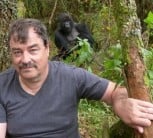This infographic explains how the universal pan-mammalian clock was developed to determine the age of mammals in the wild for conservation and the preservation of endangered species. The clock can be used in forensic science to estimate the correct age of a victim at the time of death or the age of a suspect based on forensic evidence.
Prof Nigel Bennett, Dr Daniel Hart and Dr Darren Pietersen
October 23, 2023



Dr Darren Pietersen completed his studies at the University of Pretoria (UP), beginning with research as an undergraduate student. After obtaining a PhD, he undertook two postdoctoral degrees at UP, one in the Faculty of Veterinary Science and the other in the Department of Zoology and Entomology, cumulatively spanning 15 months. Since then, he has been a research fellow at the Mammal Research Institute in UP’s Department of Zoology and Entomology.
Dr Pietersen says he is doing research at UP because it is a world-renowned university that is well known for its mammal research.
He describes his research as “varied”, as it covers mammals, reptiles and birds, all with an underlying theme of conservation. “I like studying the under-studied species, and particularly enjoy any research that will help us better conserve threatened species and, in that way, contribute to the betterment of the world.”
His current research is focused on pangolins, especially the threatened Temminck’s pangolin. He has been studying pangolins for the past 14 years, and is the lead author or co-author of several scientific articles, book chapters as well as national and global conservation assessments, such as the International Union for Conservation of Nature (IUCN) Red List assessments.
The IUCN Red List of Threatened Species, also known as the Red Data Book, is an inventory of the global conservation status and extinction risk of biological species. Dr Pietersen has been invited to attend several national and global workshops on pangolins and is a member of the IUCN Species Survival Commission Pangolin Specialist Group.
He was also part of the core team that reassessed the conservation status of all the reptile species occurring in South Africa, Lesotho and eSwatini, to be published by the South African National Biodiversity Institute later this year. Additionally, he is a member of the core group that will be reassessing all the southern African amphibian species’ conservation statuses early next year, and a member of the IUCN Species Survival Commission Skink Specialist Group and the IUCN Species Survival Commission Snake Specialist Group.
A recent highlight was being part of the Mammalian Methylation Consortium which, in August 2023, published a paper each in Science and Nature investigating the factors underlying mammalian ageing and developing a universal pan-mammalian clock.
“Also in August 2023, I published an article with Prof Mark Robertson of UP’s Department of Zoology and Entomology,” Dr Pietersen says. “The paper compares the diets of four ant- and termite-specialist mammals. I found the publishing of this article particularly rewarding because the idea first came to me more than 10 years ago when I started studying pangolins. It took several years before I started working on the article, and even longer to get it through the peer-review process. It was great to finally get it published.”
Dr Pietersen says his parents have always been extremely supportive, no matter how crazy his ideas were. “The amazing childhood that I experienced undoubtedly pushed me into a research career.”
He says he has met and collaborated with many amazing academics in his career, but the person that stands out is Prof Armanda Bastos of the Department of Zoology and Entomology at UP. He first met Prof Bastos as a third-year student when she presented some of their Zoology modules.
“Later that year, I knocked on her office door and presented her with an outlandish honours project that I wanted to undertake the following year with her as main supervisor,” Dr Pietersen recalls. “To my surprise and utter joy, she agreed. I was not the easiest student to supervise, but Prof Bastos always supported and guided me. She was co-supervisor of my PhD, and made a tremendous difference to my study. I always appreciate her honesty and advice, and she is always genuinely interested in what I’m doing. I have had the privilege of co-supervising several students with her, and we still collaborate on various projects.”
Dr Pietersen hopes to conserve threatened species and, through rigorous scientific research (rather than emotions), to help identify which species really require conservation effort.
“Part of the dream is to research species that are listed as ‘Data Deficient’ on the IUCN Red List,” he says. “Gathering more information on these species will allow us to move them into an appropriate threat category and allocate appropriate resources for their conservation.”
As for why his research matters, he says: “Certain chunks of it probably doesn’t serve much purpose other than personal curiosity, but at least some of it does influence species conservation assessments [the IUCN Red List of Threatened Species] and national policies, and in so doing, helps to conserve species.”
His advice to school learners or undergraduates who are interested in his field is to follow their dreams and never give up. “One’s life rarely follows the path that you envision, but everything happens for a reason, and eventually you will get where you are meant to be. Above all else, follow your passion, not money – life’s too short to be doing something that you don’t enjoy.”
In terms of hobbies and interests, Dr Pietersen says he is an all-round naturalist. “I spend most of my free time looking for reptiles, amphibians or birds, or learning the names of new plants if I’m in a new area. I also do a lot of reviewing for various scientific journals; I am an associate editor for Herpetology Notes and the editor of African Herp News.”
 Story
Story
This edition is curated around the concept of One Health, in which the University of Pretoria plays a leading role globally, and is based on our research expertise in the various disciplines across healthcare for people, the environment and animals.
 Story
Story
Paediatric neurosurgeon Professor Llewellyn Padayachy, Head of the Department of Neurosurgery at the University of Pretoria’s (UP) Steve Biko Academic Hospital, is redefining how brain-related diseases are diagnosed and treated, especially in low-resource settings. He’s at the forefront of pioneering work in non-invasive techniques to assess and measure raised pressure inside the skull,...
 Infographic
Infographic
Africa faces immense challenges in neurosurgery, such as severe underfunding, a lack of training positions and a high burden of disease. There is one neurosurgeon per four million people, far below the WHO’s recommendation of one per 200 000. This shortage, compounded by the lack of a central brain tumour registry and limited access to diagnostics, severely impacts patient outcomes.
Copyright © University of Pretoria 2025. All rights reserved.
Get Social With Us
Download the UP Mobile App